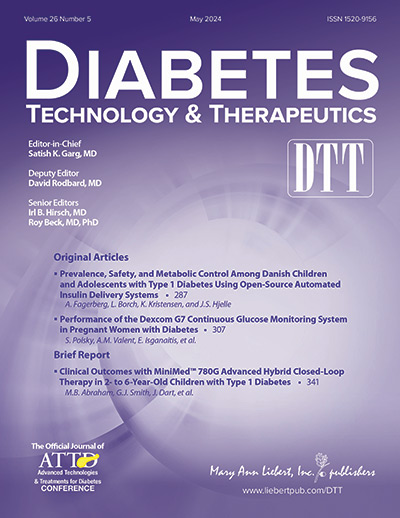Mitigating Severe Hypoglycemia in Users of Advanced Diabetes Technologies: Impaired Awareness of Hypoglycemia and Unhelpful Hypoglycemia Beliefs as Targets for Interventions.
IF 5.7
2区 医学
Q1 ENDOCRINOLOGY & METABOLISM
引用次数: 0
Abstract
OBJECTIVE A subgroup analysis of the Hypoglycemia Awareness Restoration Programme for people with type 1 diabetes and problematic hypoglycemia (HARPdoc) trial was conducted to explore the impact of Blood Glucose Awareness Training (BGAT, a hypoglycemia awareness training program) and the HARPdoc (a psychoeducation addressing unhelpful hypoglycemia beliefs) in reducing severe hypoglycemia (SH) in individuals using advanced diabetes technologies (ADTs). METHODS Data from trial participants who utilized ADTs including continuous glucose monitors or automated insulin delivery systems were extracted. Generalized linear mixed effects models with Poisson distribution or linear mixed effects models were employed to evaluate SH incidence, and Gold questionnaire, Attitudes to Awareness of Hypoglycemia (A2A), Problem Areas in Diabetes (PAID), Hospital Anxiety and Depress Scale (HADS)-anxiety, and HADS-depression scores as measures of hypoglycemia awareness, unhelpful hypoglycemia beliefs, diabetes distress, and anxiety and depression symptoms, respectively. RESULTS In the 45 participants using ADTs, the BGAT and HARPdoc interventions both reduced SH incidence by more than 50% (P<0.0001) and yielded improvements in hypoglycemia awareness (P<0.05). HARPdoc outperformed BGAT in reducing SH at month 24 (P=0.01). HARPdoc also mitigated unhelpful hypoglycemia beliefs (P<0.0001), diabetes distress (P<0.05), and anxiety symptoms (P<0.05); BGAT demonstrated no significant impacts in these respects. Neither HARPdoc nor BGAT had significant effects on depression symptoms. CONCLUSION Psychoeducation (BGAT and HARPdoc) was effective in reducing SH in people using ADTs. HARPdoc may also provide greater long-term SH reduction and improves psychological wellbeing in this patient group.减轻先进糖尿病技术用户的严重低血糖症:作为干预目标的低血糖意识受损和无益的低血糖信念。
目的对针对 1 型糖尿病患者和低血糖问题患者的低血糖意识恢复计划(HARPdoc)试验进行了亚组分析,以探讨血糖意识培训(BGAT,一种低血糖意识培训计划)和 HARPdoc(一种针对低血糖无益信念的心理教育)对减少使用先进糖尿病技术(ADTs)的患者发生严重低血糖(SH)的影响。方法从使用 ADT(包括连续血糖监测仪或自动胰岛素输送系统)的试验参与者中提取数据。采用泊松分布的广义线性混合效应模型或线性混合效应模型来评估 SH 的发生率,并采用 Gold 问卷、低血糖意识态度 (A2A)、糖尿病问题领域 (PAID)、医院焦虑抑郁量表 (HADS) - 焦虑和 HADS - 抑郁评分分别作为低血糖意识、无益的低血糖信念、糖尿病困扰以及焦虑和抑郁症状的测量指标。结果 在使用 ADTs 的 45 名参与者中,BGAT 和 HARPdoc 干预疗法均将 SH 发生率降低了 50%以上(P<0.0001),并提高了低血糖意识(P<0.05)。在第 24 个月,HARPdoc 在减少 SH 方面的表现优于 BGAT(P=0.01)。HARPdoc 还减轻了无益的低血糖信念(P<0.0001)、糖尿病困扰(P<0.05)和焦虑症状(P<0.05);BGAT 在这些方面均无显著影响。结论心理教育(BGAT 和 HARPdoc)可有效减少 ADT 患者的 SH。HARPdoc 还能在更大程度上长期减少 SH,并改善这一患者群体的心理健康。
本文章由计算机程序翻译,如有差异,请以英文原文为准。
求助全文
约1分钟内获得全文
求助全文
来源期刊

Diabetes technology & therapeutics
医学-内分泌学与代谢
CiteScore
10.60
自引率
14.80%
发文量
145
审稿时长
3-8 weeks
期刊介绍:
Diabetes Technology & Therapeutics is the only peer-reviewed journal providing healthcare professionals with information on new devices, drugs, drug delivery systems, and software for managing patients with diabetes. This leading international journal delivers practical information and comprehensive coverage of cutting-edge technologies and therapeutics in the field, and each issue highlights new pharmacological and device developments to optimize patient care.
文献相关原料
| 公司名称 | 产品信息 | 采购帮参考价格 |
|---|
 求助内容:
求助内容: 应助结果提醒方式:
应助结果提醒方式:


